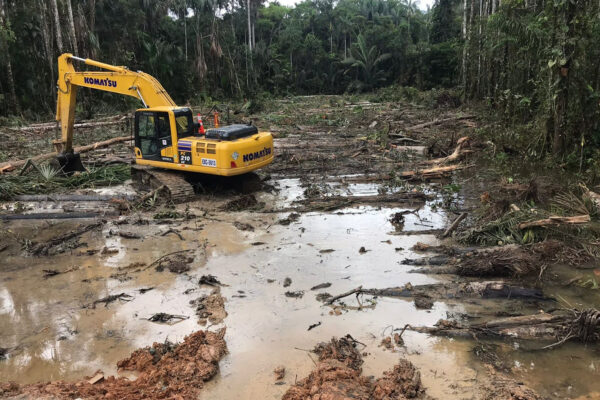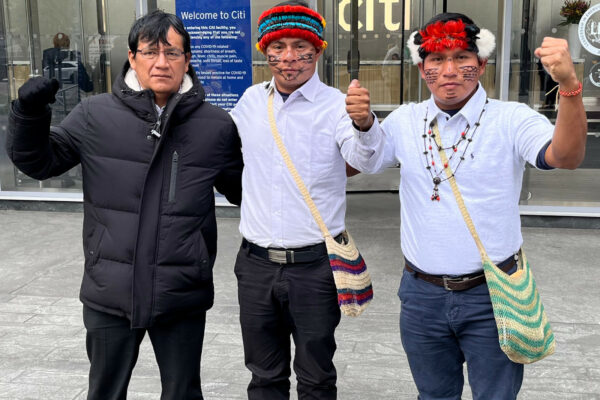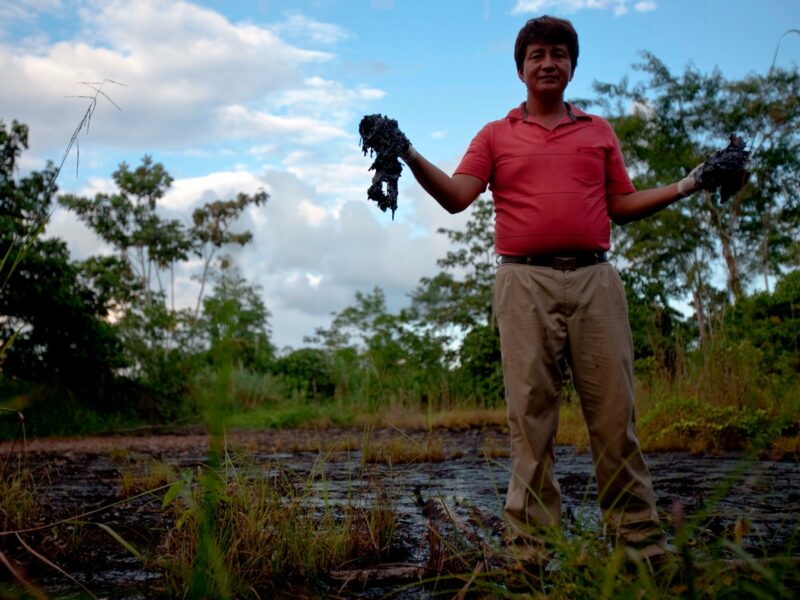Chevron Corp. (CVX) is facing its first test of whether farmers and fishermen from the Amazon rainforest will collect $19 billion in environmental damages from the world’s fourth-largest oil company.
A group of 47 Ecuadoreans have asked Ontario’s Superior Court of Justice to seize Chevron assets in Canada, ranging from an oil sands project to offshore wells, to satisfy a 2011 court ruling in the Latin American nation that ordered the company to pay for oil pollution dating to the 1960s. Chevron said the Ecuadorean judgment is outside Ontario’s jurisdiction and that the ruling resulted from bribery and fraud.
A hearing in Toronto today marks the Ecuadoreans’ inaugural step in a global collection effort that includes seizure attempts in Argentina and Brazil. The Ecuadoreans estimated Chevron has $12 billion in Canadian assets, a figure that equates to almost half of the company’s 2011 profit. An adverse Ontario ruling for Chevron would put at risk fuel-manufacturing and oil-production operations across Canada.
“It’s a cause for concern and it probably means this isn’t going to go away,” Robert Sweet, who helps manage $150 million at Horizon Investment Services in Hammond, Indiana, said in a telephone interview. “As with all ecological disasters, this is going to take a long, long time to resolve.”
The company’s presence in Canada dates back to the 1930s and includes an oil-refining complex in British Columbia, an Alberta oil-sands venture, offshore wells in the Atlantic Ocean, and cash held in Canadian bank accounts.
‘Every Strategy’
San Ramon, California-based Chevron was on the losing side of last year’s ruling by a provincial Ecuadorean court that blamed decades of toxic soil and water contamination on Texaco Inc., which Chevron acquired in 2001. Texaco was found to have discharged into the environment saltwater and other byproducts of oil drilling. Texaco quit the country and its equipment was taken over by the Ecuadorean state oil company in 1992.
The $19 billion ruling handed down last year by a court in Lago Agrio, a town near Ecuador’s border with Colombia, held Chevron accountable for health and environmental damages resulting from chemical-laden wastewater dumped from 1964 to 1992.
The Ecuadorean plaintiffs, from the remote northern Amazon River basin, are seeking enforcement of the judgment outside their home country because Chevron has no refineries, oil wells, storage terminals or other properties in the nation. Pablo Fajardo, their lead lawyer in Ecuador, said during a February 2011 conference call with reporters he would “use every strategy and manner at our disposal” to collect the award.
Corporate Veil
In a Nov. 23 filing, Chevron argued the Ontario court has no jurisdiction to grant the Ecuadorean judgment because the company’s Canadian units are indirect subsidiaries with independent boards separated from the U.S. parent by several levels of ownership.
The Ecuadoreans face an “uphill battle” because they must convince the court that Chevron and its Canadian operations should be treated as one entity rather than separate companies, said Barry Leon, a partner and head of the international arbitration group at Perley-Robertson, Hill & McDougall LLP in Ottawa.
“The expression that gets used legally is ‘lifting the corporate veil’ and disregarding the separate personalities,” Leon said. “The courts generally, in Canada and elsewhere, have been reluctant to do that.”
Chevron rose 2.1 percent yesterday to close at $105.58 in New York. Shares have declined 0.8 percent this year.
Pending Arbitration
The Ecuadorean judgment was “a product of bribery and fraud,” Kent Robertson, a Chevron spokesman, said in an e-mail statement, referring to Chevron’s long-held position that the court ruling was influenced by the country’s government. If the plaintiffs were confident in the “integrity” of the ruling, they would seek enforcement in U.S. courts with jurisdiction over the parent company, he said.
Alan Lenczner, the Toronto attorney from the firm Lenczner Slaght Royce Smith Griffin LP representing the Ecuadoreans, when reached by phone declined to comment on the case.
“Whatever the outcome, it’s likely that the initial decisions will be appealed,” Leon said. “It’s been extremely hard-fought by both sides having many lawyers and having spent what’s been a phenomenal amount of money because there’s so much at stake.”
Chevron doesn’t disclose how much it spends on legal fees, Robertson said in a telephone interview.
The Hague
Chevron is awaiting a ruling in a related case before the Permanent Court of Arbitration, the 113-year-old panel based in The Hague that handles trade disputes between corporations and nations. Chevron filed the arbitration claim in 2009, accusing the government of Ecuador of reneging on a 1998 contract that absolved Texaco of Amazonian pollution claims. Three days of hearings in the case concluded yesterday, Robertson said.
Chevron’s campaign to avoid payment suffered a setback last month when the U.S. Supreme Court upheld a lower-court decision that rejected the company’s request for a pre-emptive block on collection efforts in Chevron’s home country. The lower court had ruled that it didn’t have authority to thwart payment when the Ecuadoreans hadn’t yet filed such a claim in the U.S.
Following the filing of their Canadian seizure request in May, the Ecuadoreans sought similar forfeitures in a Brazilian tribunal in June and in Argentina earlier this month. A judge in Buenos Aires ordered some Chevron bank deposits held in escrow while the case is pending, Enrique Bruchou, a lawyer for the Ecuadoreans, said in an interview on Nov. 7.
Unfair Influence
“I’m more concerned now than I was a couple of months ago now that the Ecuadoreans have found other governments that appear to be at least moderately friendly to their case,” Sweet said.
Chevron has accused the Ecuadorean government of unfairly influencing court proceedings that led to the $19 billion ruling and alleged that a damage assessment provided by a court- appointed expert was ghostwritten by consultants and lawyers hired by the plaintiffs.
Lawyers for the Ecuadoreans including Stephen Donzinger have accused Chevron of engaging in a campaign to discredit them, entrap an Ecuadorean judge that presided over the case and set up dummy corporations in Ecuador to hide Chevron’s alleged role in testing soil samples from the pollution sites.
Ecuador ranked 120th out of 183 nations in Transparency International’s 2011 corruption-perception index, where No. 1 New Zealand is perceived to be the most honest. Albania, Liberia and Lesotho were perceived as less corrupt than Ecuador, according to the index.
In February 2011, Chevron filed a racketeering lawsuit that’s ongoing against the Ecuadoreans and their lawyers in New York for “leading a fraudulent litigation and PR campaign against the company.”
Exxon Mobil Corp. (XOM) is the world’s biggest oil company by market value, followed by PetroChina Company Ltd. and Royal Dutch Shell Plc (RDSA), according to data compiled by Bloomberg.













